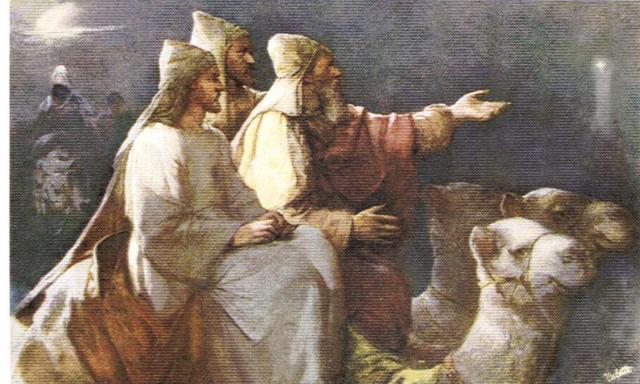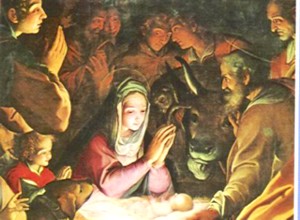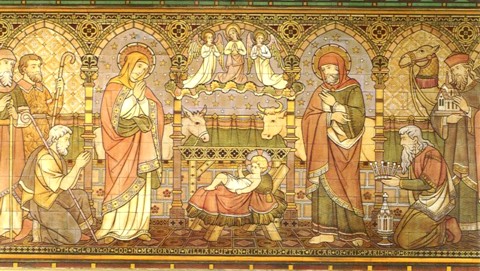Eliot in his Essay also commented that Andrewes used “flashing phrases” that enabled his auditors to remember the substance of the sermon. One such phrase figured in Eliot’s poetry – “Word without a word.” Reference to this figured three times in Andrewes’ Nativity Sermons in which he referred to “the eternal Word” as having always existed and the co-creator of the universe but now as a babe not “able to speak a word.” Until He can speak, the world will live in darkness. In his poem for Ash Wednesday Eliot took this “flashing phrase” to highlight that the world still lives in darkness as the Word is still unheard, aand partly answered by the chorus impact of that line from "The Reproaches" - "O my people what I have done unto thee?" He also posed the question, where can it resound? Perhaps what is needed is the prayer of the cloistered for those who walk in darkness.
If the lost word is lost, if the spent word is spent
If the unheard, unspoken
Word is unspoken, unheard;
Still is the unspoken word, the Word unheard,
The Word without a word, the Word within
The world and for the world;
And the light shone in darkness and
Against the Word the unstilled world still whirled
About the centre of the silent Word.
0 my people, what have I done unto thee.
Where shall the word be found, where will the word Resound?
Not here, there is not enough silence
Not on the sea or on the islands, not
On the mainland, in the desert or the rain land,
For those who walk in darkness
Both in the day time and in the night time
The right time and the right place are not here
No place of grace for those who avoid the face
No time to rejoice for those who walk among noise and deny the voice
Will the veiled sister pray for
Those who walk in darkness, who chose thee and oppose thee,
Those who are torn on the horn between season and season, time and time, between
Hour and hour, word and word, power and power, those who wait
In darkness?
Will the veiled sister pray
For children at the gate
Who will not go away and cannot pray:
Pray for those who chose and oppose
O my people, what have I done unto thee.
“Word’ and “Words” as various images appear throughout his later poems. We find it in all shades in the fifth stanza of Burnt Norton. “Words move … Words … reach into the silence. … Words strain … The Word in the desert/Is most attacked by the voices of temptation.”
Shortly after his baptism he wrote The Journey of the Magi, the first of the Ariel Poems, all dealing with some aspect of Christmass. When one reads this poem one must be conscious of the juxtaposing of birth/death. As a fledging Christian, Eliot, like the magi, was a new seeker of Christ. He and the Magi were both undertaking a new journey, a journey unknown. Whereas as Eliot knew, when Andrewes preached his magi sermons, his journey was almost complete.
What happens to one when one sets out on journey to meet the Christ? That was Eliot’s dilemma, obvious in the poem. It is paved with great dangers as reflected too in the magi journey.
In his Essay on Andrewes Eliot had commented on “that concrete presence” that Andrewes forces on us, no better illustrated than in the opening lines of this poem taken straight from Andrewes’ 1621/2 Christmas sermon.



 A cold coming we had of it.
A cold coming we had of it.



 Just the worst time of the year
Just the worst time of the year


 For a journey, and such a long journey:
For a journey, and such a long journey:


 The ways deep and the weather sharp,
The ways deep and the weather sharp,
In his preaching Andrewes’ sermon stressed the magi’s difficulties in travelling to reach the little village of Bethlehem, outside Jerusalem. He preached, “Their journey ... [was] exceeding dangerous, as lying through the midst of the ‘black tents of Kedar,’ a nation of thieves and cut-throats; to pass over the hills of robbers, infamous then, and infamous to this day.”
When Eliot continued his poem he spoke of dangers too, not only physical ones but also personal ones. Thy physical is like the waste land – a description of the old life before Eliot’s baptism but to which one has to die. Yet the temptations are still there and one continually struggles with them. Furthermore the world becomes hostile to one when one is no longer doing the worldly things. Listen you will hear it, summed up in these lines, culminating in the last line “this was all folly”.
 There were times we regretted
There were times we regretted
 The summer palaces on slopes, the terraces,
The summer palaces on slopes, the terraces,
 And the silken girls bringing sherbet.
And the silken girls bringing sherbet.
Then the camel men cursing and grumbling

 And running-away, and wanting their liqour and women,
And running-away, and wanting their liqour and women,
And the night- fires going out, and the lack of shelters,

 And the cities hostile and the towns unfriendly
And the cities hostile and the towns unfriendly
And the villagers dirty and charging high prices:
A hard time we had of it.
At the end we preferred to travel all night,
Sleeping in snatches,
With the voices singing in our ears, saying
That this was all folly.
 But has one really died to the old self? The question is pondered. What of the new life in Christ? Eliot knows there are deep stirrings within him, but still that struggle between birth of the new way and death to the old continues. That old world still goes on, in fact gallops as illustrated in the “white horse” galloping “across the meadow”. That stirring in Eliot is illustrated in these lines:
But has one really died to the old self? The question is pondered. What of the new life in Christ? Eliot knows there are deep stirrings within him, but still that struggle between birth of the new way and death to the old continues. That old world still goes on, in fact gallops as illustrated in the “white horse” galloping “across the meadow”. That stirring in Eliot is illustrated in these lines:
Then at dawn we came down to a temperate valley,
Wet, below the snow line, smelling of vegetation;
With a running stream and a water-mill beating the darkness,
Yet on the horizon there are three trees. – A reminder that in the Christian journey one always lives in the shadow of Calvary. As Andrewes preached at Christmass “the cross already hovers over the cratch.
Even after some progress in the life of a Christian, the journey is still so much in the old world, reflected in these lines of Eliot.
Then we came to a tavern with vine-leaves over the lintel,
Six hands at an open door dicing for pieces of silver,
And feet kicking the empty wine-skins.
In his sermon Andrewes preached that when the magi reached Jerusalem there was:
No sight to comfort them, nor a word for which they any wit the wiser; nothing worth their travel. They had not found the place, until they asked. Perhaps that is what made the journey satisfactory.
In the last stanza of Eliot’s poem he took those words of Andrewes “This set down” to highlight the dramatic struggle, between death and birth, doubt and certainty; seek and find.
For Andrewes even though the magi did not receive a sign of comfort to find the Christ they knew they must. “They will take Him as they find Him, and all this notwithstanding, worship Him for all that.” That was the purpose of the journey, to give Him homage.
Scripture tells us they returned home another way, implying to avoid Herod. But perhaps there is another meaning to consider that once one has met Christ life it is never the same again – it takes another direction. In finding Him, in Andrewes’ words, they realised that “Christ [is] the bright morning star of that day that will have no end.”
This is what Eliot is also saying, once one meets Christ there is another journey. But it is not easy. It is “hard and bitter”; it is agonising as “the old dispensation” gives way to the new, or “another death”. There will indeed be many deaths, many “disturbing uneasiness” for those who want to be like the magi and have their lives changed by knowing and loving the Christ.
Andrewes concluded his first magi sermon, “that to come to Christ is one of the wisest parts that ever these wise men did, or we or any else can do in all our lives.”
Eliot accepted this too, as illustrated in the last line of his poem:
I should be glad of another death.
Not long after Epiphany the Church begins Lent on Ash Wednesday. Man has sinned, and therefore needs a redeemer. What joy that is to the sinner. Yet man sins over and over again, and so he constantly needs recourse to saving grace. However this is not automatic – one cannot put all on Christ’s shoulders and not do anything himself as Andrewes expressed it. He needs to repent of his sin, which for Andrewes involves metanoia, that is a complete turning, turning away from sin and turning to God, “a perfect revolution”. This prelate addressed this in his sermon on Ash Wednesday 1621/2.
First, a ‘turn,’ wherein we look forward to God, and with our ‘whole heart’ resolve to ‘turn’ to Him. Then a turn again wherein we look backward to our sins wherein we have turned from God, and with beholding them our very heart breaks. These two are two distinct, both in nature and names; one conversion from sin; the other contrition for sin. One resolving to amend that which is to come, the other reflecting and sorrowing for that which is past. One declining from evil to be done hereafter; the other sentencing itself for evil done heretofore. These two between them hereafter, the other sentencing itself for evil done heretofore. These two between them make up a complete repentance, or to keep the word of the text, a perfect revolution.
However we are reluctant to turn away from our sins even during Lent; indeed we do not even weep for them, but by grace this can become a circle that Andrewes made so clear in his own prayer life, echoed in these refrains.
 Vellem, si plus. [I wish it were more
Vellem, si plus. [I wish it were more
Metuo, ne. I fear it should be.
Doleo quod non. I am sorry it is not
Gauderem, si. I would be glad if.]
This refrain links with a marginal comment Andrewes made in his notes on the Prayer Book
against the General Confession “That desire to be penitent, wish they were, would be glad if they were so,
fear they are not enough; are sorry they are no more.”
The second appearance links a vision of glory with an act of penitence. Andrewes’ general intercession ends with the plea that he, and all those for whom he prays and indeed all the people of God, may come into the kingdom, stand there in righteousness and be filled with the glory. Thus in the refrain the emotional gradient is downwards:
 Cuperem ut [I wish it
Cuperem ut [I wish it

 Gauderum si I would be glad if
Gauderum si I would be glad if

 Metuo ne I fear it should be
Metuo ne I fear it should be
Doleo quod non. I am sorry it is not.]

 The third and last time the refrain appears is near the end of an act of penitence, expressing a most personal unworthiness, characteristic of Andrewes . He reflects that his sorrow in not enough:
The third and last time the refrain appears is near the end of an act of penitence, expressing a most personal unworthiness, characteristic of Andrewes . He reflects that his sorrow in not enough:
 Doleo enim utcunque [ I do grieve somewhat
Doleo enim utcunque [ I do grieve somewhat
 Metuo quidem ut satis I fear it is not enough
Metuo quidem ut satis I fear it is not enough
 Cuperem ut magis I wish it were more
Cuperem ut magis I wish it were more
 Gauderem si magis I would be glad if it were more
Gauderem si magis I would be glad if it were more 
Doleo quia non magis I grieve it is not more.]
 Longing and gladness, here, are enclosed by misgiving and grieving, and are only to be thought of, now, in the service of sorrow, though he trusts not much to sorrow (even that needs grieving for) as he admits his sorrow is in a sorry state):
Longing and gladness, here, are enclosed by misgiving and grieving, and are only to be thought of, now, in the service of sorrow, though he trusts not much to sorrow (even that needs grieving for) as he admits his sorrow is in a sorry state):
Fateor dolendum dolorum meum I confess that my grieving needs grieving for
et doleo ipse tam dolendum and myself grieve that it much needs grieving for.
Eliot’s poem Ash Wednesday hovers around this notion of “turning” too as seen in the refrain:
Because I do not hope to turn again
Because I do not hope
Because I do not hope to turn,”
“There is no life that is not in community/ And no community not lived in the presence of God.” wrote Eliot in The Rock. That applies to the church too, whose life is shared in Christ through the Spirit. There can be no individualism or following one’s own inclination. Andrewes was very critical of his contemporaries who followed their own spirit rather than the Holy Spirit in his preaching. One of the reasons for his outspokenness about this was that he believed that the parish church is where the local community assembled to offer up their prayers and praises. Eliot lamented also that church community life no longer existed as families spent Sundays as a day off of religion, and so bells were no longer necessary in the city to summon people to church as he expressed it in “The Rock”.
That the country now is only fit for picnics,
And the Church does not seem to be wanted
In country or in suburb.
Another reason for Andrewes emphasising the importance of the parish church was to uphold the visibility of the church against those who spoke of it in terms of being invisible. This too is seen in Eliot’s comments on community.
 What life have you if you have not life together?
What life have you if you have not life together?
There is no life that is not in community,
The nearest expression of monastic life in the early Post-Reformation Church was by the Ferrar family who lived at Little Gidding. The family maintained twenty four hours of prayer, with the long hours of the night vigil taken by Nicholas who was a deacon.
The first stanza has echoes of Andrewes’ Pentecost sermons with its constant reference to the Spirit as both “fire” and “water” and its melting and freezing. “Between melting and freezing/ The soul’s sap quivers.” Andrewes preached, The Spirit is such a fire that it will “burn to the world’s end,” but it will also melt “the frozen dregs” of sin that is so baked” on man. But the Spirit will scatter man’s “trangressions as a mist, and make your sins like a morning cloud to vanish away.” The Apostles were baptised with fire but they in turn baptised with water. So the Holy Spirit sometimes uses “‘fire’” and other times “‘water’” – “fire to warm” and “water to cleanse us.” This fire will “burn to the world’s end” but the water springs life eternal.
 Little Gidding was a place “where prayer has been valid” and where “prayer is more/than an order of words.” It was a place “to kneel” and where praying was “the conscious occupation”. It has been part of the timelessness of intercessions – something that has been forgotten in England now on Sundays.
Little Gidding was a place “where prayer has been valid” and where “prayer is more/than an order of words.” It was a place “to kneel” and where praying was “the conscious occupation”. It has been part of the timelessness of intercessions – something that has been forgotten in England now on Sundays.
Andrewes lamented that so many contemporaries chose to ignore God or make their own god, and so he always preached that there would be a day of reckoning. The day would come when they would lie on their death bed. As Eliot expressed it, “Life you may evade, but Death you shall not.” For Andrewes true knowledge was to know Christ, and particularly Christ crucified. Eliot lamented that this is no longer the case “All our knowledge brings us nearer to death./ But nearness to death, no nearer to God. … The cycles of Heaven in twenty centuries/ Bring us further from God and nearer to the Dust.” Man still does not know the Word or want to.



